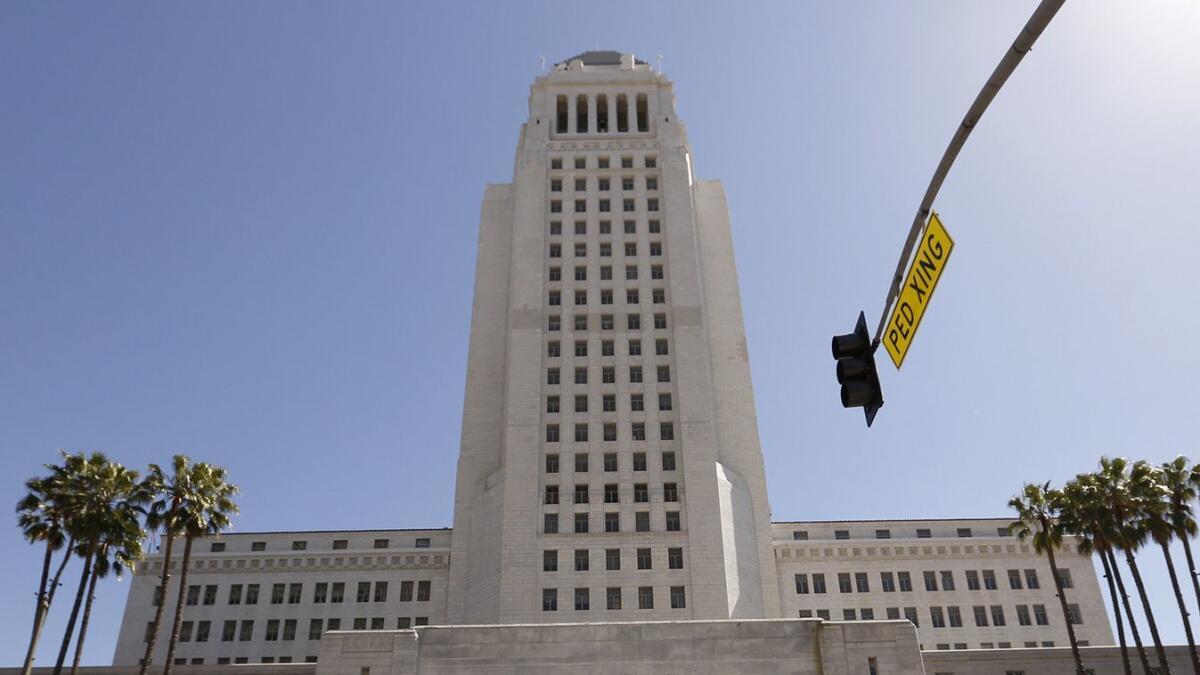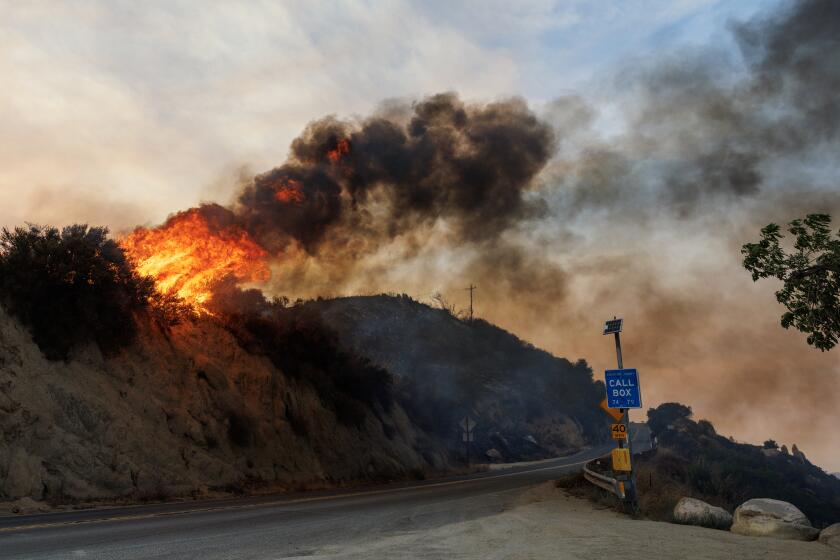Column: L.A. City Hall’s real rat problem: Corruption

On the south side of Los Angeles City Hall, several floors above Mayor Eric Garcetti’s office and the homeless people who nap on the lawn, a quote from the Roman statesman Cicero is chiseled into the face of the building.
“He that violates his oath,” it says, “profanes the divinity of faith itself.”
Judging by recent ongoing corruption investigations, it appears that several occupants of City Hall may have missed Cicero’s admonition on their way into the building. They also seem to have ignored the engraving on the north side of the building, this one by the 19th century poet James Russell Lowell:
“The highest of all sciences and services — the government.”
In the last five months, Los Angeles has suffered heartbreaking defeats in the World Series and the Super Bowl, but we are still in contention for the national corruption crown, proudly refusing to play second fiddle to Chicago, Philadelphia or any other city.
Mayor Garcetti must be regretting he didn’t run for president. I can imagine him waking up, reading the morning paper and wishing he were in Iowa.
At City Hall, where public policy and a pay-to-play culture are cozy cousins, probes into possible corruption reach into several offices. And they center on an age-old problem in L.A. — those doing business at City Hall, including developers, make sizable donations to the public officials who vote on their building proposals.
Take Garcetti’s former deputy mayor, Raymond Chan. The feds recently obtained a search warrant for his emails, seeking evidence of possible crimes involving bribery, extortion, money laundering and kickbacks. That warrant sought information involving more than a dozen people, including Councilmen Jose Huizar and Curren Price and the chief of staff to council President Herb Wesson.
The good news, I guess, is that there is a longer list of elected officials not being targeted for anything, and I should note that nobody has been hauled away in handcuffs yet. No wrongdoing on the part of anyone has been established, and no charges have been filed. Also, it’s only fair to point out that questions about the quality of leadership around here extend beyond L.A. City Hall.
For instance, a special election will be held next month to replace L.A. Unified school board member Ref Rodriguez, who pleaded guilty last year to a felony count of conspiracy and three misdemeanor counts related to his reimbursing contributors to his campaign to disguise where the money had come from. Meanwhile, former Los Angeles Assemblyman Sebastian Ridley-Thomas is facing an Assembly investigation into claims that he sexually harassed two legislative staffers. He’s moved on from his job as a legislator, but he’s returned to Sacramento — as a lobbyist, of course.
And recently elected L.A. County Sheriff Alex Villanueva is trying his best to roll back reforms instituted by his predecessor after former Sheriff Lee Baca and others were convicted in a long-running corruption probe. To further establish his bona fides, Villanueva reinstated a deputy fired after allegations of domestic abuse, noting that the man’s accuser had waited a year to come forward.
Are you following all of this?
I still haven’t gotten to the former ethics commissioner who’s running for City Council in apparent violation of the city charter. And then there’s the city fire marshal, who says he was forced out by the Garcetti administration at the behest of the all-powerful firefighters union after exposing what he called “illegal and fraudulent acts” by inspectors.
But I don’t have all day and neither do you.
Still, we shouldn’t forget that we’re still waiting to hear what — if anything — will come of federal and county grand jury snooping into donations made in the 2015 reelection campaign of L.A. Councilwoman Nury Martinez. She told The Times in September that she hadn’t heard from investigators and had “no idea who they’re talking to,” but Times reporters found four people who said they did not make campaign donations to Martinez that were listed under their names.
And last week, on the same day that my colleague David Zahniser reported on a $50,000 developer donation to a campaign committee just weeks before the FBI raided the home and office of Councilman Huizar, Dakota Smith reported that it’s not just federal agents who are running around City Hall: There’s a rat infestation, with the critters chewing carpets and nesting in potted plants. I don’t know if the FBI has thought of it, but rat-cams could be useful.
“Employees shouldn’t have to come to work worried about rodents,” said Council President Wesson. Yeah, and voters shouldn’t have to worry about rats in the council chambers.
Last week, I wrote about my own battle with rats living in my attic and walls, so I’m now something of an expert, as well as a sympathizer. If City Hall puts a pest control contract out to bid, I’d like to apply. But I haven’t made any campaign donations, so what are my chances?
“It stinks,” said Jay Handal, of the West L.A. Neighborhood Council, when I asked what he thought of the current state of the city. “If people had no trust in government before, God knows they should have less than no trust now.”
A couple of years ago, City Councilman David Ryu and others called for a ban on donations from developers seeking approval for their projects. It went nowhere, but the idea is being kicked around again, which gives at least the appearance that the council is genuinely concerned about the spate of embarrassing revelations.
But would such a ban really matter, or pass legal muster?
No on both counts.
First of all, how do you define what a developer is, and do you also ban donations from the developer’s wife, friends and employees?
Also, why single out developers? Some would argue that the city’s structural budget deficit is directly related to the clout wielded by public employee unions. Do you ban union donations, too?
“Everyone knows right now that developers, lobbyists and unions run this city,” said Handal. “The City Council members are puppets and those groups are the puppeteers.”
Whether you think that’s true or not, lawyer and former Ethics Commissioner Jessica Levinson said the courts have consistently protected campaign donations as a form of free speech. And even if you could block donations to candidates from real estate companies or unions, the big bucks in politics are filtered through independent committees and the pet causes of politicians.
As Zahniser just reported, a real estate company with an interest in converting a portion of the old Times building into two high-rise towers made a $50,000 donation to a campaign committee with ties to Huizar. Within two months, Huizar sided with the developer, Onni Contracting (California) Inc., though no wrongdoing has been established. The campaign committee, Zahniser reported, has collected more than $290,000 since 2017, much of it from real estate interests in Huizar’s district. And three donors told The Times they gave to that campaign fund to support Huizar’s wife, who was planning a campaign to replace him on the City Council.
So how can we get the rats out of City Hall?
“The best approach,” despite its limitations, said Kathay Feng of Common Cause, “would be to do what the feds do, and ban all non-individual donations to candidates.”
Another approach would be to open up a bigger window into the sausage factory. Currently you can go to the city Ethics Commission website and find information about who is donating to whom, Levinson said, but why not connect the dots for voters? Information could include what percentage of donations come from groups such as developers or unions, as well as how the officeholders vote on matters involving those donors.
That brings us to perhaps the best disinfectant of all, which is for residents to pay closer attention, read the paper, hold public officials accountable and storm the polls at election time.
With all due respect to Cicero, given the current state of things, a more apt engraving on the face of City Hall would be:
“Welcome one and all, step right up, and pay to play.”
Get more of Steve Lopez’s work and follow him on Twitter @LATstevelopez
More to Read
Sign up for Essential California
The most important California stories and recommendations in your inbox every morning.
You may occasionally receive promotional content from the Los Angeles Times.











